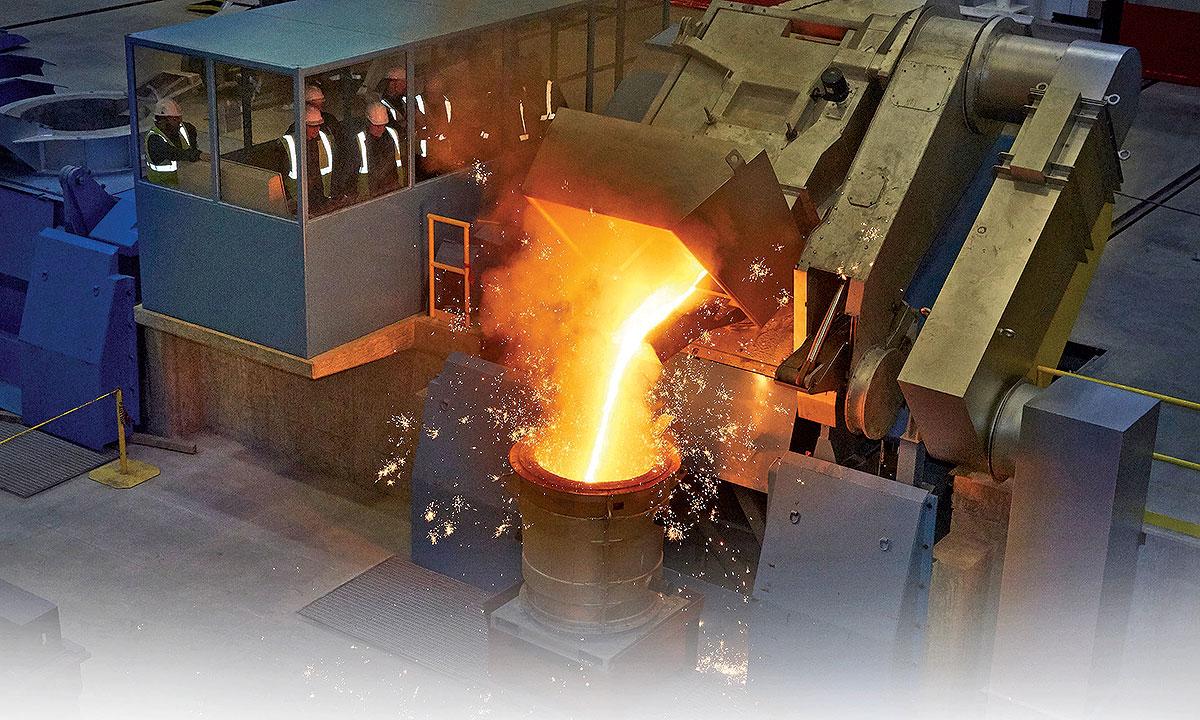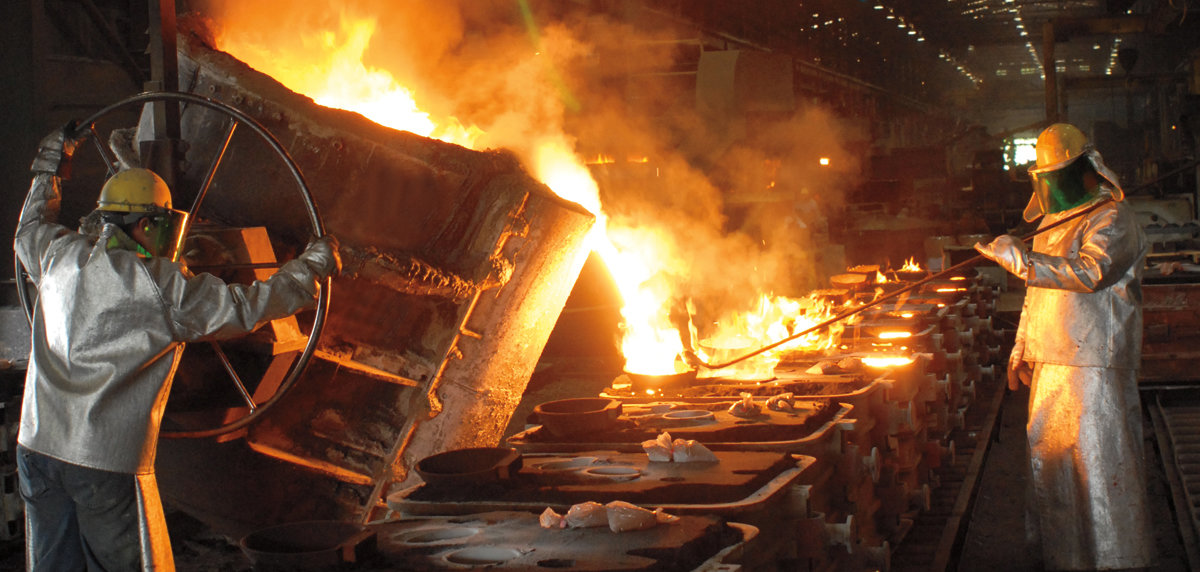Why Metal Casting drives innovation in modern manufacturing
Just How a Metal Foundry Contributes to Lasting Metal Manufacturing Practices
Metal foundries play a necessary role in promoting sustainability within the metal manufacturing sector. By integrating recycled products, they reduce dependence on virgin resources and minimize ecological impacts. Energy-efficient melting procedures better reduce power usage and emissions. The trip toward lasting techniques involves more than simply recycling and power monitoring. It incorporates a wider dedication to ethical sourcing and innovative innovations. The effects of these techniques are considerable and warrant closer exam.
The Duty of Recycling in Metal Foundries
While metal manufacturing has actually traditionally relied on virgin materials, the increasing focus on sustainability has actually brought about a considerable change in techniques, particularly in metal foundries. Recycling has arised as a vital element of this makeover, permitting foundries to repurpose scrap metal and minimize dependence on extracted sources. By incorporating recycled materials right into their processes, foundries not only reduce ecological influence but additionally reduced production costs.
The use of recycled metals, such as light weight aluminum, steel, and copper, decreases power usage and minimizes greenhouse gas discharges associated with typical mining and refining approaches. Foundries can attain high-grade outputs by utilizing sophisticated sorting and handling modern technologies to assure the purity of recycled materials. This emphasis on reusing fosters a circular economic climate, where waste is decreased, and sources are made use of successfully. As a result, metal foundries play a critical duty in advertising sustainable practices within the metal production market.
Energy-Efficient Melting Strategies
Energy-efficient melting strategies are essential for enhancing sustainability in metal manufacturing. These methods substantially reduce power intake throughout the melting process, which is among one of the most energy-intensive stages in metal manufacturing. Technologies such as induction melting, resistance heating, and microwave melting deal boosted effectiveness contrasted to typical methods. Induction melting, as an example, makes use of electromagnetic areas to create heat directly within the metal, reducing energy loss and supplying exact temperature level control.
In addition, applying warmth healing systems can even more boost effectiveness by reusing and recording waste heat created throughout melting. Utilizing advanced insulation materials and enhancing heater styles additionally contribute to energy savings. By embracing these innovative melting methods, metal foundries can decrease their carbon footprint, decrease functional expenses, and add to a more sustainable manufacturing landscape. The combination of energy-efficient practices not just aligns with environmental objectives but likewise meets the expanding need for accountable production techniques in the metal industry.
Lasting Sourcing of Raw Materials
Sustainable sourcing of resources is important for reducing the ecological effect of metal production. This involves the raised usage of recycled steels, the fostering of honest mining methods, and initiatives aimed at regional sourcing. By prioritizing these methods, the sector can advertise responsible source management and support neighborhood economies.

Recycled Metal Application
Just how can industries efficiently minimize their ecological effect while meeting the growing need for metal? One significant technique is the application of recycled metal. By incorporating scrap metal right into their manufacturing procedures, foundries can lower the extraction of virgin materials, therefore conserving natural deposits and lowering power consumption. Recycled metals call for much less energy to process compared to their raw counterparts, resulting in reduced greenhouse gas discharges. Additionally, the usage of recycled metal aids divert waste from land fills, advertising a circular economy. Industries that focus on recycled metal not only add to sustainability however likewise take advantage of expense savings related to lowered material procurement. As a result, recycled metal use stands as an important approach for eco accountable metal manufacturing.
Honest Mining Practices
While the need for steels continues to increase, industries are progressively acknowledging the significance of ethical mining methods in making sure responsible sourcing of raw materials. Honest mining incorporates a dedication to ecological stewardship, social responsibility, and adherence to reasonable labor practices. Companies are now focusing on collaborations with mines that show transparency in their procedures, reducing ecological influence and appreciating local neighborhoods. This approach not just fosters a sustainable supply chain however likewise improves the track record of businesses included. By applying extensive criteria and certifications, sectors can combat illegal mining tasks and promote the well-being of workers. Inevitably, honest mining methods add markedly to a more sustainable metal production ecosystem, lining up economic growth with ecological and social integrity.
Local Sourcing Campaigns

Advancements in Metal Casting Processes
Developments in metal casting procedures are changing the industry by incorporating advanced recycling strategies that reduce waste. Energy-efficient melting techniques are additionally being established to minimize power consumption throughout production. Furthermore, making use of cutting-edge mold and mildew materials adds to enhanced efficiency and sustainability in casting procedures.
Advanced Recycling Techniques
Advanced recycling strategies are changing metal casting procedures, greatly improving sustainability in the industry. These developments concentrate on recycling and redeeming scrap metal, significantly lowering waste and the demand for virgin products. Strategies such as hydrometallurgy and pyrometallurgy enable foundries to remove beneficial metals from used parts, ensuring efficient resource usage. In addition, advanced sorting and filtration modern technologies enhance the quality of recycled metals, making them appropriate for high-performance applications. This not just lessens the ecological impact of metal manufacturing yet also cultivates a circular economy by promoting the reuse of products. As these recycling techniques continue to evolve, they assure to further simplify operations within foundries and contribute to an extra lasting metal production landscape.
Energy-Efficient Melting Methods
While typical melting approaches have long been the backbone of metal casting, recent developments have introduced energy-efficient strategies that considerably minimize energy usage and exhausts. Technologies such as induction melting and electrical arc heaters have gotten importance, enabling precise control over temperature level and minimizing the demand for nonrenewable fuel sources. These methods not only enhance power efficiency but also promote quicker melting times, which equates to reduce operational costs. In addition, technologies in heat healing systems make it possible for foundries to record and reuse excess warm created throughout the melting procedure. This all natural method to energy management not just sustains sustainable practices but likewise settings metal foundries as leaders in the change towards greener production procedures, better lining up with worldwide sustainability objectives.
Innovative Mold Products
As the demand for even more effective and lasting metal casting processes grows, the exploration of innovative mold materials has ended up being a prime focus in the industry. Standard mold and mildew materials typically add to environmental challenges, Continue motivating the look for alternatives that decrease waste and power intake. Current advancements include the development of eco-friendly binders and recyclable composites, which not only improve mold performance but likewise decrease ecological impact. Additionally, making use of 3D printing modern technology in mold and mildew development allows for intricate designs that minimize material use and allow rapid prototyping. These cutting-edge materials not just enhance casting precision but likewise align with sustainability objectives, showcasing the sector's dedication to reducing its carbon footprint while maintaining high-quality manufacturing criteria.
Decreasing Waste Via Advanced Innovation
Cutting-edge modern technologies are changing the metal production industry by significantly decreasing waste and improving efficiency. Advanced data analytics and equipment understanding algorithms allow foundries to optimize manufacturing procedures, minimizing and recognizing ineffectiveness scrap product. Smart sensors keep an eye on equipment efficiency in real-time, enabling predictive upkeep that lowers downtime and waste generation. Furthermore, additive manufacturing methods, such as 3D printing, enable the production of complicated elements with marginal product usage, markedly reducing waste contrasted to typical techniques.
Furthermore, closed-loop systems are becoming a lot more common, wherein scrap metal and by-products are recycled back into the production cycle, guaranteeing that products are made use of to their maximum possibility - Metal Foundry. This combination of technology not just promotes resource preservation however additionally boosts the general sustainability of metal production techniques. By embracing these innovations, foundries can add to a more lasting future while maintaining competitiveness in the marketplace
The Influence of Foundries on Carbon Impact Reduction
Foundries play a crucial duty in decreasing the carbon footprint of the metal production market by implementing different lasting practices. By utilizing energy-efficient modern technologies, such as electrical arc heaters, these centers significantly lower greenhouse gas discharges contrasted to traditional techniques. Additionally, foundries significantly take on eco-friendly energy sources, which also lessens their reliance on fossil gas.
Recycling scrap metal is an additional vital technique that foundries employ, conserving resources and decreasing the need for virgin materials. This not only lessens waste but likewise lowers the energy-intensive removal procedures connected with mining. Furthermore, the adoption of closed-loop water supply aids to lessen water usage and reduce wastewater discharge, adding to an extra lasting operation.
Through these initiatives, foundries show their dedication to ecological stewardship, bring about a significant decrease in the total carbon impact of the metal manufacturing industry. Their recurring efforts are crucial in the change towards an extra sustainable commercial landscape.
Frequently Asked Questions
What Kinds of Metals Are The Majority Of Typically Recycled in Foundries?
Aluminum, steel, copper, and brass are among the most frequently recycled metals in foundries. These metals are preferred due to their high recycling rates, financial value, and extensive schedule, contributing substantially to industrial sustainability efforts.
Just How Do Foundries Ensure the Top Quality of Recycled Materials?
Foundries determine the high quality of recycled materials via rigorous testing, arranging, and filtration procedures. They apply innovative innovations to assess structure and eliminate pollutants, ensuring that the recycled metals fulfill sector requirements for performance and safety.
What Accreditations Exist for Sustainable Foundry Practices?
Various qualifications exist for lasting foundry techniques, including original site ISO 14001 for environmental monitoring, ISO 50001 for energy administration, and LEED certification for sustainable structure techniques (Aluminum Foundry). These qualifications aid ensure adherence to ecological and sustainability requirements in operations
How Do Foundries Determine Their Carbon Impact Decrease?
Foundries determine carbon footprint decrease with devices like lifecycle analyses, power audits, and emissions tracking systems. They contrast standard emissions to present outputs, reviewing improvements in energy efficiency, product usage, and renewable energy adoption over time.
What Are the Financial Advantages of Lasting Metal Manufacturing?
Sustainable metal manufacturing provides financial benefits such as decreased functional prices, increased effectiveness, enhanced market competitiveness, and prospective government incentives. Furthermore, it fosters technology and attracts eco conscious customers, inevitably driving lasting profitability for organizations.
Metal foundries play an important function click for more in advertising sustainability within the metal production industry. While metal manufacturing has actually traditionally depended on virgin products, the increasing emphasis on sustainability has actually led to a significant change in methods, particularly in metal foundries. By integrating scrap metal into their manufacturing procedures, foundries can lower the removal of virgin products, therefore decreasing and saving all-natural sources energy intake. Foundries play an essential duty in lowering the carbon impact of the metal manufacturing industry by implementing various sustainable methods. Reusing scrap metal is an additional important method that foundries employ, preserving sources and lowering the demand for virgin materials.